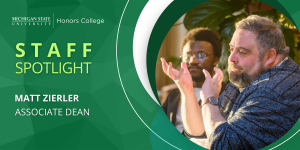
By Tracy Anderson and Sloane Barlow
From a faculty fellow to interim dean to his current role as associate dean, Matt Zierler has left a lasting impact on the MSU Honors College community.
After more than a decade of service, Zierler plans to transition back to working full time at James Madison College in conjunction with a sabbatical leave that includes travel abroad to help support his teaching curriculum.
Zierler, who has been described as a passionate advocate for students across the university, believes in the transformative power of an MSU Honors education.
“As a teacher, scholar, and administrative leader, Matt has had a lasting, positive impact on generations of Honors College students,” said Honors College Dean Christopher Long. “On behalf of the students, staff, and faculty connected to the Honors College, we thank Matt for his extraordinary service and leadership.”
Honors from the start
Zierler first began working at Michigan State University in 2003 as a member of the JMC faculty. Since day one, he worked with Honors students by providing Honors options. His first interaction with the Honors College dates back to 2006 while serving on a selection committee for the National and International Fellowships and Scholarships (NIFS) office.
Zierler continued to serve on more NIFS selection committees over the next couple years, and in 2013 he was hired by the Honors College to start as a part-time faculty fellow in the NIFS Office. In the following four years, his job as a faculty fellow was to recruit and advise students applying for fellowships such as the Truman scholarship, Carnegie program, Rhodes scholarship, Marshall scholarship, and many others.
In 2017, Zierler became associate dean of the Honors College, where he oversaw all academic affairs in the Honors College, while still teaching part time in JMC. He ensured Honors options were offered, helped advisors with discussing students’ personal pathways, became the point of contact for the debate team, and continued to sit on NIFS and ADS (Alumni Distinguished Scholarship) selection committees.
Studying abroad brings real world to teaching
As a researcher and political scientist, Zierler looks forward to spending more time drafting and submitting his work for review for an academic journal and studying abroad. His research focuses on the foreign policy of Azerbaijan, where he will travel in the spring in hopes of observing its changes since he last visited in 2016.
“I really want to look and listen and visit parts of the country I haven’t seen before,” Zierler said.
In addition to Azerbaijan, he plans to visit other countries in the South Caucasus, including Armenia and Georgia, and possibly part of Central Asia like Kazakhstan and Uzbekistan.
“Studying abroad helps my teaching as well,” Zierler said. “The more I can incorporate real-word stuff into my teaching, students see what’s really going on and it encourages them to study abroad and learn languages that they haven’t thought of before. And if I can make connections for them for jobs or internships, that will help them too.”
Zierler has studied abroad with his students in the past in hopes of helping them achieve their educational goals. “I don’t think of my research as narrowly for me. Students are still the most important part when it comes to my research.”
Connecting Honors to campus
As Zierler reflected on his years at the Honors College, he noted his success in making the Honors College more visible to colleagues across campus and in the academic affairs unit.
“Before I started, we were never represented on the University Committee on Undergraduate Education,” Zierler said. “The voice of the Honors College wasn’t there. It’s not that my colleagues forgot about us, it’s just that sometimes you have to be ‘in the room.”’
Zierler also specialized in resolving issues and helping support the advisors. “We want students to chart their own path,” he said. “But with 4,500 Honors students, there’s always going to be hiccups.” With that in mind, he noted his role as a team player and supporting his colleagues being one of his greatest accomplishments at the Honors College.
“I’ve always said I work in the two best colleges on campus, because I’m doing things that directly affect the undergraduate student experience,” Zierler said. “And at the end of the day, any mark of my success is the success of students.”
Leading Honors to success
Christine Raisanen leads the advisors at the Honors College and worked with Zierler often.
“The Honors College advising team values Dr. Zierler’s collaborative, team-oriented approach to overseeing academic affairs,” she said. “His thoughtfulness and dedication to student success has been invaluable, especially in the last several challenging years.”
Assistant Dean Bess German recalled when Zierler led the Honors College through much of the pandemic.
“Matt’s support of his colleagues when he served interim dean gave us a sense of stability during a very challenging time, and I will always remember the support he provided,” German said. “I’m equally grateful for all the ways he has contributed to the honors experience at MSU in so many facets of our community as a faculty member, mentor, colleague and administrator—a community in which he will undoubtedly remain a part.”
